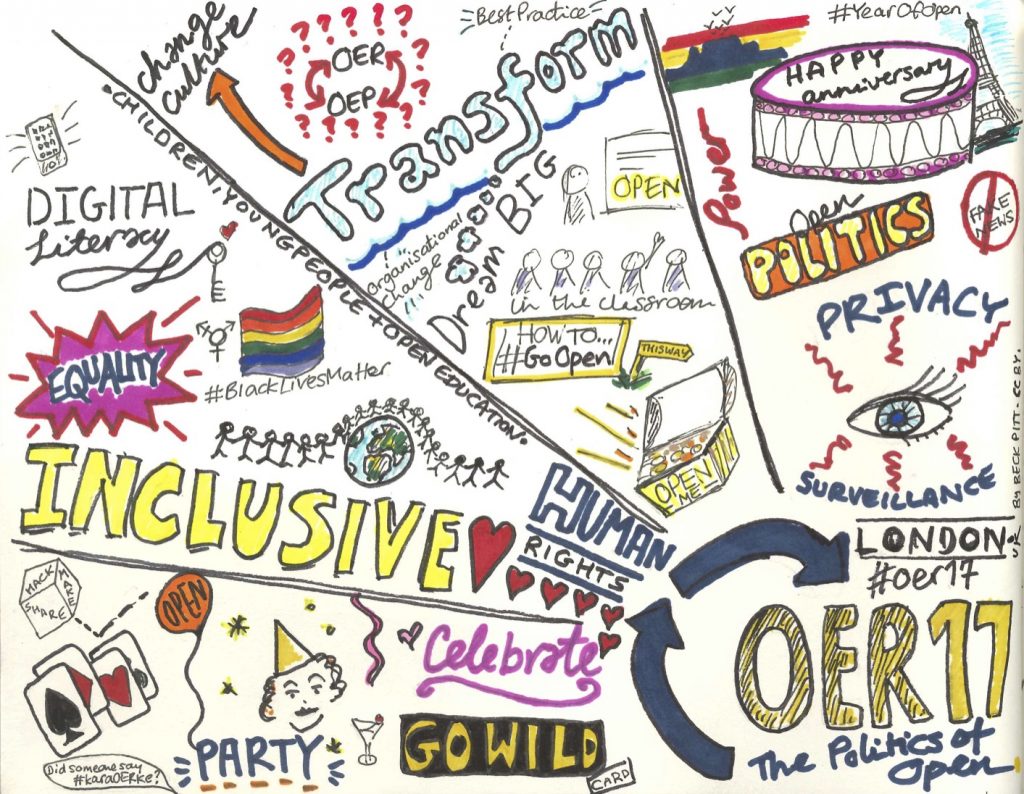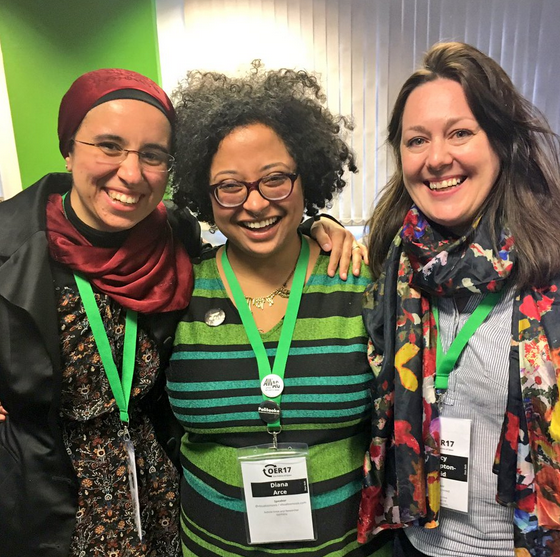
So many important conversations, so much valuable work, so many new connections made and friendships celebrated. Thanks OER17.
Over the past 11 days or so since OER17 ‘The Politics of Open’ ended, I’ve read as many conference blog posts as possible. There are a remarkable number of interweaving stories and interpretations of the conference, all unique (see the list of OER17 posts). I’ve commented on many blogs but neglected to write my own post… so here I’ll link to some of the posts that have struck a particular chord with me, and add just a few thoughts.
One conversation immediately following the conference has stayed with me. I found myself in lively conversation with co-chairs from four OER Conferences: Martin Weller (OER15), Lorna Campbell (OER16), Josie Fraser (OER17), and Vivien Rolfe (OER18). Each (I think) has been involved since the very first conference. The conversation touched on the fact that each conference has pushed beyond the previous one in a considerable way, and indeed none would have been possible without the previous ones. This is something I have observed since I began attending in 2015, more so than with other conferences — most notably in the engagement with critical approaches to openness. This seems to apply to our work in open education also.
Many OER17 participants have remarked and/or written about the conference focus on criticality, equality, social justice. The conference created space for the personal and the emotional, described in wonderful posts by Sheila MacNeill, Kelly Terrell, Suzan Koseoglu, and Lorna Campbell. OER17 was also a conference of great generosity — in ideas as well as personal interactions. Maha Bali arrived from Cairo bearing gifts, and her keynote mentioned countless others whose words and work she has learned from and built on. She acknowledged and shared these while weaving her own unique story of openness. This generosity continued throughout the conference. Some presenters shared their slides before the conference, inviting feedback (e.g. Frances Bell & Suzan Koseoglu), and noting that comments and feedback helped them to develop their ideas even further. The work of Paulo Freire was referenced by many participants (e.g. see Javiera Atenas & Annalisa Manca) but so was the work of many other activists and educators, quite a few of whom were at the conference. Collectively, we knitted our ideas, publicly and generously, into a broader body of work.

The strong and diverse voices of women were notable at the conference — from the 3 brilliant keynote speakers onward. Thank you, Maha Bali, Diana Arce, and Lucy Crompton-Reid. Helen Crump reflected on this in her thoughtful post, Thinking critically about women & care relative to openness. It was intentional that FemEdTech chose OER17 to share their/our collective and nascent ideas for an open network of feminists in edtech and open education, inviting conversation and participation. If you are interested in exploring, please check out current conversations at @femedtech and #femedtech and do get in touch.
All of these conversations move us forward: the tentative, the inviting, the declarative, the challenging. As David Kernohan notes in his brilliant post Roaming Autodidacts and the Neo-Reactionaries: “the will is as important as the tool… the will to collaborate, corroborate and develop”.
Finally, I want to thank all whom I collaborated with before, during, and after the conference.
- Caroline Kuhn and I collaborated on a workshop, Towards open praxis: Storytelling and narrative inquiry in open education research. Caroline wrote a wonderful post describing the genesis of our ideas and the workshop. Here also are links to our workshop slides and a collection of resources.
- Laura Czerniewicz and I collaborated on a presentation, Critical pragmatism and critical advocacy: Addressing the challenges of openness. We described our exploration of critical theory and these two particular concepts as lenses for our open practice/open research. We plan to explore these ideas in more depth and welcome feedback from anyone else considering these ideas (link to our presentation slides).
- As part of the final plenary panel, I had the pleasure of working closely with Josie Fraser, Muireann O’Keeffe, and Laura Czerniewicz in the weeks leading up the conference. In addition to sharing our own reflections, we invited all participants (at the conference and following online) to share their conference reflections and to share their intentions following the conference (using the hashtags #IWill and #oer17). Both proved to be powerful expressions of early collective outcomes of the conference.
- After the plenary panel, I participated in the last of the OER17 Virtually Connecting sessions with Sukaina Walji, Laura Czerniewicz, Kate Green, and Christian Friedrich, chaired by Helen DeWaard — so enjoyable, many thanks to all.
- Finally, it was a joy to be part of early discussions for the #critoep panel session Critical open educational practice in a time of walls and borders with Sheila MacNeill, Frances Bell, Kate Bowles, Josie Fraser & Vivien Rolfe. I was sorry not to participate in the session, due to a scheduling conflict, but these ideas continue to reverberate — check out this terrific post by Josie Fraser for more.
I’d like to mention many, many more lovely conversations and thought-provoking sessions from OER17. Please check out the OER17 blog posts to explore some of these. These conversations will continue, there is no doubt. I am very grateful to two presentations in particular — Beck Pitt and the OER Research Hub for illuminating international OEP and Sukaina Walji and ROER4D for exploring OEP in Global South contexts. You have sparked my thinking in new ways and offered exciting possibilities for collaboration. Thank you 🙂
Thanks finally to all OER organisers, keynotes, presenters, and participants. Every voice, every person, was part of creating this special happening. The ripples continue…
Image: OER17 Themes, CC BY 2.0 Beck Pitt
Lovely and thoughtful post. As a newcomer to this wonderful community I am still in awe. Reading your post I get the feel of OER as this big family gathering that happens once a year where the more experienced come together with those who are still not so sure about what to say but convinced that it is a worthwhile conversation to have.
A gathering of grandparents that always have wisdom to share due to their lived experience and the time they had to translate theory into practice offering their praxis and bringing along their views into the conversation; the aunts and uncles that are knowledgeable but still keen to hear their parents’ wisdom, and perhaps, as they are getting older, agree to some of the knowledge that what was denied when they were younger. The cousins are also present making more noise and challenging that what the previous generations are saying and daring to think differently, proposing new alternatives guided by their drive and different lived experience. No matter the space where each of the members of that big family is and what it is that that they want to share, there is always a place in the table for all. I still feel like the cousins and nephews, inexperienced but driven to find out more about open praxis, and open to challenge my beliefs and ideas. Understanding and finding new meanings to ‘the political’ and more confident with ‘the critical’ through deep and engaging conversations with the more experienced ones, those who are in the academic space for longer and are wise but at the same time humble and generous with us the less knowledgeable and experienced, making us feel at home and safe to ask and acknowledge what we still don’t understand. Thank you for inviting me to be part of this big and loving family where criticality and politics are served with wisdom and care. Nothing could have been better for someone who is stepping not only into a new subject but also in a new country and a new continent. I have lost many things when I decide to leave, but I can say 5 years later, I feel I have found my tribe and I am very proud to be part of this loving and caring family!
BTW, your new room Catherine, feels cosy and welcoming, well done you!!!
Thank you, Caroline – you express this so beautifully. Some of the OER17 posts that touched me most deeply were those that focused on identity and feelings of inclusion/exclusion. There will always be people who are known more than others, who speak more than others, for a variety of reasons. But if we ‘walk our talk’ (as mentioned by at least one person in the final conference reflections), we will be open in speaking and sharing but also in listening, inviting, welcoming, and making space (for other people as well as for the unexpected). So many people at OER17 did this, in person and in their sessions. This aspect of openness, the humility of openness, is essential in building a strong community, I believe. Thanks for expressing this so wonderfully here, and thanks for commenting in my new room/blog – much appreciated 🙂